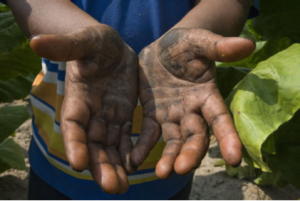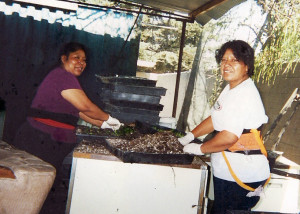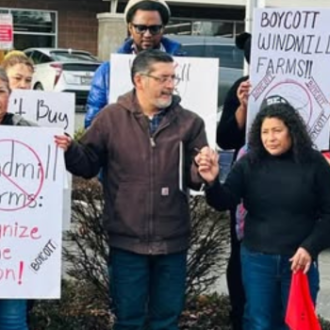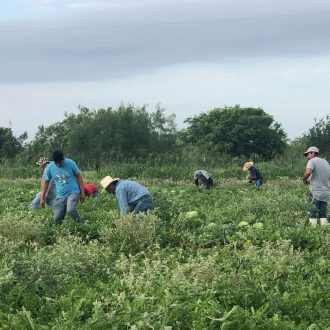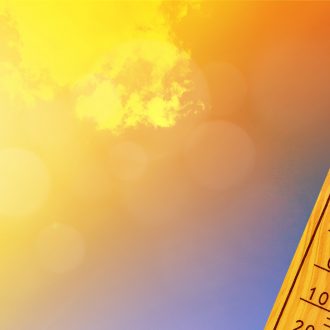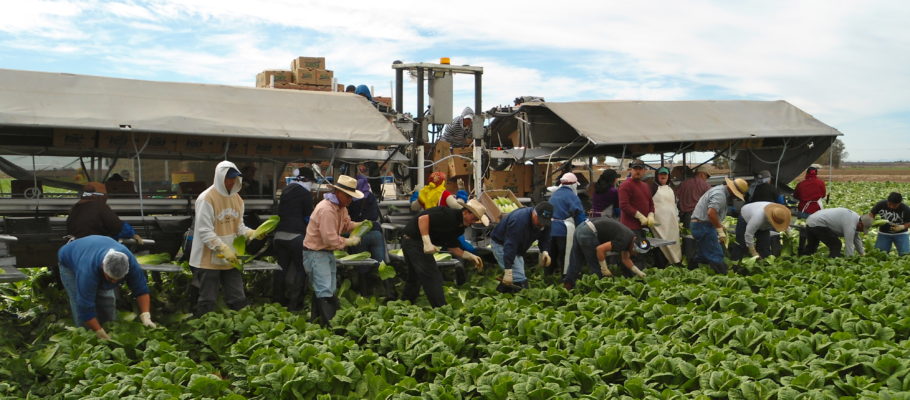
In the coming weeks, NFWM will be sharing stories that lift up the voice and value of farm workers – the people we depend on every day for the food that fills our tables and supermarket aisles. Despite their importance to the U.S economy, most farm workers lack legal status, suffer abuse and are afraid to speak out. Farm workers deserve Comprehensive Immigration Reform that provides them with a path to citizenship!
Read these stories and take action.
1. Raul | North Carolina Farm Worker
Last fall I met Raul, a farm worker who picks vegetables in North Carolina. We spoke in the barren room that he shared with six other men at the labor camp. He also shared bathrooms and showers (as do many of the workers) that were dirty, lacked privacy, and were freezing in the autumn air; not an inviting scenario for washing off the toxic pesticides which they come in contact with in the fields.
But that wasn’t Raul’s primary concern. What he talked about was how desperately he missed his children. He does not have legal papers so he can’t go back and forth to Mexico where he is from. “I have not seen my children in over five years,” he said. “But I make these sacrifices so they don’t have to.”
Our families are fed by hundreds of thousands of men and women, like Raul, who are separated from their own families. Enough! Those who have been separated from their families by a man-made border should have the chance to travel back and forth from home to work. It is a moral travesty that we separate migrant farm worker families in order to feed US families. We need immigration reform!
Virginia Nesmith, Executive Director, National Farm Worker Ministry
2. Jonathan Cortez | Son of a farm worker family
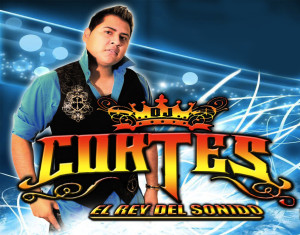 My name is Jonathan Cortez. I am 24 years of age and I am from Veracruz, Mexico. I currently live in Fellsmere, Florida. I am the oldest child and I have three younger sisters. I was born on February 2nd, 1989. I attended Sebastian River High and I went to Indian River State College for two years. My current occupations include: DJ, photographer, video and film producer, web developer, computer technician and computer repair specialist.
My name is Jonathan Cortez. I am 24 years of age and I am from Veracruz, Mexico. I currently live in Fellsmere, Florida. I am the oldest child and I have three younger sisters. I was born on February 2nd, 1989. I attended Sebastian River High and I went to Indian River State College for two years. My current occupations include: DJ, photographer, video and film producer, web developer, computer technician and computer repair specialist.
I came here to the U.S when I was about six years old, and my life as an immigrant has been tough. We came here to this country to have a better life and a better education. My parents spent over 10 years as migrant farm workers, so I never got to finish a year in school because I had to move so much. It was sad moving from state to state, but my parents recognized that it had to be done to support our family.
There are many people like me who can succeed in life, but are not permitted to do so because we are considered “criminals” that broke the law by coming to the U.S. I struggle with my business due to not having a driver’s license. I struggle to find and keep a steady job, due to having no social security number. I struggle to continue my studies and to become someone in life, because it’s hard for me to attend a state university or college. I have the knowledge and the certificates, as well as a $10,000 scholarship offer, to continue my education. But ever since my graduation in 2008, I haven’t been able to attend school. As an immigrant, there are so many things that I am capable of doing, but like others I’m kept in the shadows.
This is what many immigrants and farm workers go through in the U.S. We want the opportunity to continue our studies, have a valid driver’s license, not be separated from our families, and to continue working. We are all people – human beings – who are no different from one another. We all laugh. We all have feelings. We all eat, and look for the same thing in life. We are people with minds and we are not given the opportunity to have our voices be heard.
While I wait for the country to decide our fate as immigrants, I have applied for the Deferred Action for Childhood Arrivals. My name is Jonathan Cortez and this is my story.
3. Guadalupe Hernandez | Former Farmworker
My name is Guadalupe Navarro Hernandez. I migrated to the United States three times. The first time, I was 12, the second time I was 23, and the last time I did it was not long ago.
I migrated to the United States because I could not find a job here, in Mexico, and because the little money that my family earned was not enough to support my children or to pay for our most pressing needs. Leaving my family was very painful, but I wanted to be able to provide for them. I wanted the American Dream.
The first time I migrated I rode the “bestia”, or the train, in order to reach the Northern border. Once I arrived to the United States, I found a job working in the fields of Washington State, picking apples, peaches, cherries, asparagus, squash, and cucumber. I worked hard, even during the winter. Sometimes I went hungry because I did not have enough money for food, much less to send to my family in Mexico. I was not able to get help because I was undocumented. I was always hiding. The working conditions were not good and the wages were low, but I had to put up with it because I did not have papers.
The second time I lived in the United States, I worked in California at a restaurant. I worked from noon until 2 or 3 in the morning. In addition to that job I worked 5 hours at a fast food restaurant.
The last time I went to the United States I lived in California, where I worked as a farm worker. This time I worked with lots of workers, from China and Vietnam. We picked celery and some Asian crops. We started working at 6 in the morning and our workday was over 12 to 14 hours later. When I started the job, we were paid $5.25 per hour. By my third year I was earning $6 per hour. The workers who had papers were getting paid $12 to $16 per hour.
The working conditions were also bad. We were given only 30 minutes to eat lunch. We had to work under the heat and we were not given water breaks. The grower watched us work with his binoculars from the top of a building. I put up with these conditions for my children. I have 5 children and I needed to send them money so that they could go to school.
In order to go to the United States, I had to cross the desert. I walked for 10 days. My group started with 45 people, 15 who were women, but at the end only 17 of us made it, only 3 women. When I was walking in the desert we had nothing to drink. The water we had managed to bring with us was boiling. We had no food. We didn’t eat for four days. During my journey, my legs really hurt. My feet had wounds. My body was full of thorns from when we had to crawl under fences. I had several cuts. It was very hot. We usually walked at night and rested during the day.
I think that the dangers of the journey are worse now than what they used to be. Migrating to the United States is like looking for your death. People are victims of violence at the border. Jobs are scarce in the United States. Our people humiliate themselves in order to work a few hours, at any price. Undocumented people in the United States live like they have no rights. That is why I hope that they pass a comprehensive immigration reform bill.

